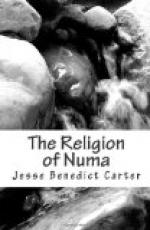This was a very characteristic beginning to Augustus’s activity. It was primarily the human element to which he was appealing in his religious changes, and hence the priesthoods needed especial attention. It was not long after the battle of Actium that he restored another very ancient priesthood, that of the Arval brothers. This was a very old priesthood consisting of twelve men who took part in the purification of the land, the Ambarvalia, so called because the ceremony consisted of a solemn procession around the boundaries of the fields. But as the Roman territory grew and such a ceremony in the old fashion became impossible and was carried out merely symbolically by sacrifices at various boundary points, the Arval brothers lost all their importance, so that even in these symbolic sacrifices their place was taken by the pontiffs. Augustus however recognised in this priesthood an effectual means of emphasising the agricultural side of Roman life, and of connecting the imperial family with the farming population. The centre of this new worship was the sanctuary in the sacred grove at the fifth milestone of the Via Campana, and it is there that the wonderful discoveries have been made of the inscriptions giving the “minutes” of the meetings of this curious corporation, beginning with Augustus. But the pastoral side of their worship was an insignificant matter, even in the age of Augustus, compared with their prayers and supplications in behalf of the imperial house, so that the records of this supposedly agricultural priesthood form one of our best sources for the study of emperor-worship.
Three other priesthoods, the pontiffs, the augurs, and the guardians of the Sibylline books (XVviri) did not need actual restoration, for their ability to interfere in politics had kept them alive during the closing centuries of the republic, when political usefulness was the surest means of surviving in the struggle for existence. But the fact that they had been politically powerful made the control of them all the more necessary for an emperor who wished to have in his hands all the possibilities of political influence. It was contrary to Augustus’s policy openly to crush any of the institutions which had really been or, what was from his standpoint very much the same thing, had been thought to be a bulwark of republicanism. As a matter of fact however these priesthoods had been one of the chief means of bringing the republic into the control of one man. Hence for Augustus the problem was easy to solve; it was only necessary to appear to honour these priesthoods by raising their dignity still higher and by making only men of senatorial rank eligible, and then to take the chief position in them himself and to fill them with his own supporters. Thus the republic was apparently saved and the empire was really strengthened.




